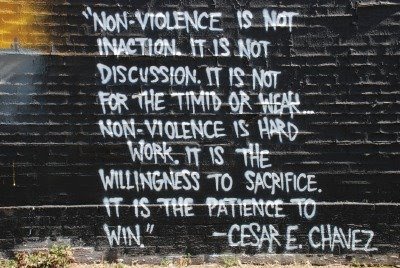Nonviolent Training in the United States
by Theodore Olson

Poster art courtesy occupysantacruz.org
Editor’s Preface: This unpublished essay was a paper presented at the study conference Training in Nonviolence (Perugia, Italy, 13-20 August 1965) under the joint auspices of War Resisters’ International, and is another in our series of rediscoveries from the WRI archive. Please see the notes at the end for further archival references, a link to a pdf scan of the original, and biographical information about the author. JG
By nonviolent training we mean conscious attempts, in the context of teaching and learning, to impart historical experience, general concepts, technical skills and personal experience in how to act effectively and nonviolently in conflict situations. By “nonviolently” we mean to stress programmatic or active nonviolence, as exemplified by, but not restricted to, social action struggles: for example, Gandhi’s actions in India and that of the peace and civil rights activists in the United States.
But as we shall see, this definition, if applied retrospectively, would deny the name of training to much that in former years passed under that name. And if applied too narrowly it would eliminate from consideration much governmental or quasi-governmental work related to nonviolent training. Therefore the paper will proceed in great part descriptively, not attempting to pass final judgment on all that is called nonviolent training in the United States, but trying instead to relate these efforts to the definition and perhaps to test the definition.
Read the pdf of the complete article here: Nonviolent Training in the United States
Reference: IISG/WRI Archive Box 65: Folder 1, Subfolder 2. We are grateful to WRI/London and their director Christine Schweitzer for their cooperation in our WRI project.
EDITOR’S NOTE: Theodore (Ted) Olsen was an early member of the Committee for Nonviolent Action, and a frequent contributor to Liberation Magazine. His 1961 pamphlet, “Discipline in a Nonviolent Action Movement” brought him to the attention of Dave Dellinger and other well known activists with whom he was to cooperate. He should not be confused with the conservative lawyer of the same name.




